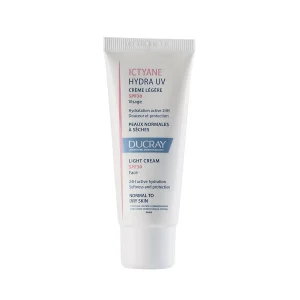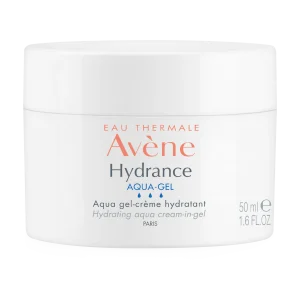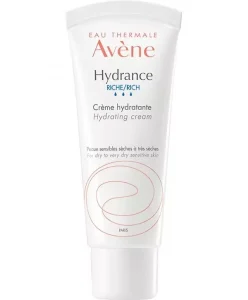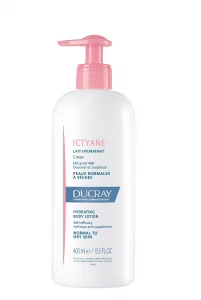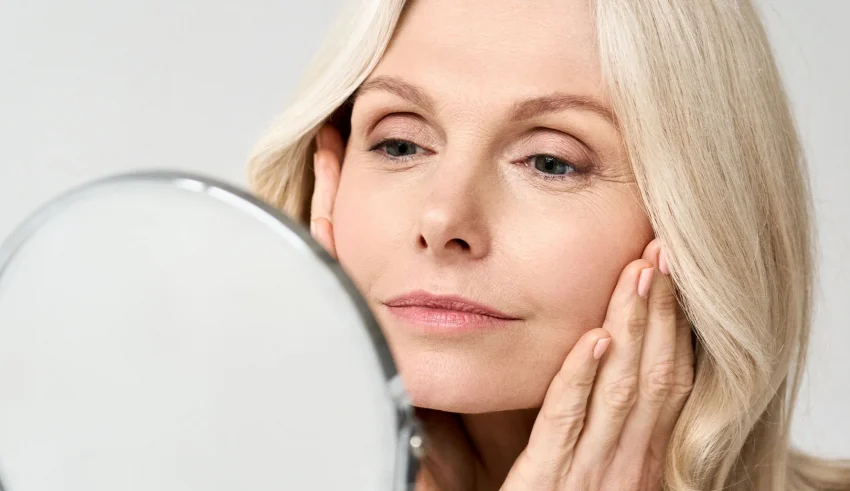
If you’ve noticed dry skin patches on your body, you’re not alone. Many people experience these dry spots. They can result from several conditions, including contact dermatitis, psoriasis, and more. In this article from The Dermo Lab and in collaboration with the dermatologist Dr. Sameer Zimmo, we describe some common medical conditions and other factors that can cause dry skin, as well as how to treat them.
What causes dry patches on the skin?
Dry patches on the face are localized areas where the skin lacks moisture. According to Dr. Sameer Zimmo, a dry skin patch looks rough, erythematous, and scaly, with severe fissures.
What causes dry skin patches on the face? Dry patches can have multiple causes, many of which can be effectively treated. We list them below:
1- Contact dermatitis
Contact dermatitis is a skin condition that develops when you come into contact with a substance that triggers a skin reaction. It usually causes a discolored, itchy rash.
2- Psoriasis
Psoriasis is an autoimmune disease that causes skin cells to multiply too quickly. People with psoriasis can develop scaly, itchy patches of skin on their bodies.
3- Eczema
Eczema, also known as atopic dermatitis, can occur at any age. This condition causes itchy patches that can range in color from reddish brown to grayish brown, depending on your skin color. These patches may crust over when you scratch them.
4- Athlete’s foot
You don’t have to be an athlete to get an athlete’s foot. This condition is caused by a fungal infection and usually affects the area between the toes.
Symptoms include a scaly rash that is itchy, tingly, or burning. An athlete’s foot is contagious. It can be spread by sharing personal items or walking on floors where the fungus lives.
5- Dry air
Sometimes dry, cool air can rob your skin of moisture and cause dry patches of skin to appear.
In summer, higher humidity can help keep your skin from drying out. But too much sun exposure can also leave you with dry skin.
6- Dehydration
If you don’t drink enough fluids throughout the day, you may develop dry skin patches.
7- Sun damage
The sun’s UV rays damage the skin barrier, which can worsen the symptoms of pre-existing skin conditions and cause sunburn or dry patches of skin on the face. UVB rays are particularly harmful to the skin barrier.
8- Smoking
Smoking can be a trigger for dry skin. It can also lead to wrinkles and a dull complexion.
9- Age
As you age, your pores naturally produce less oil, and you may notice that your skin becomes drier. Patches of dry skin in older people often appear on the following areas:
- Lower legs
- Elbows
- Arms
10- Stress
Stress can affect your body in many ways. Some people develop dry skin.
If you have a condition like psoriasis or eczema, stress can make your symptoms worse or cause a flare-up.
11- Soaps and over-washing
Using or overusing harsh soaps, perfumes or antiperspirants can dry out your skin. Also, taking long, hot baths or showers can make the problem worse.
How to treat dry skin patches?
Dr. Sameer Zimmo affirms that you should apply a moisturizer frequently to treat dry skin patches.
Dry skin is one of the leading causes of rough patches. Skin care products that moisturize and provide gentle exfoliation can be an effective way to help smooth and soften the rough, bumpy skin associated with dryness.
Skin care products typically contain a combination of ingredients from one of three categories: humectants, occlusives, and emollients.
1- Humectants
Humectants are molecules that increase the skin’s moisture content and improve its barrier function by absorbing water from the environment and drawing water from the inner layer (dermis) to the outer layer of the skin (epidermis). Products containing humectants are particularly useful for conditions characterized by an altered skin barrier, such as eczema and psoriasis.
Common humectants: Glycerin, ceramide, and alpha hydroxy acids (glycolic acid, lactic acid, hyaluronic acid).
2- Occlusives
Occlusives help prevent dry patches of skin on the face by forming a water-resistant barrier film on the skin that retains moisture. Occlusives should be used with an emollient to ensure optimal skin hydration.
The most common occlusives: Beeswax, petroleum, and kerosene.
3- Emollients
Emollients are chemical compounds that soften and smooth the skin by filling in small cracks and gaps in the epidermis. Emollients help retain moisture and soothe patches of rough, flaky, dry skin. Moisturizers often contain emollients as one of the main ingredients to treat dry skin.
Common emollients: Collagen, glyceryl stearate, elastin, shea butter, and squalene.
Check out the following moisturizers that help restore the skin barrier to retain moisture and remove dead skin cells to improve the texture of rough, bumpy skin.
For the face:
Ducray Ictyane Hydra UV Light Face Cream SPF 30
To be applied only in the morning.
Eau Thermale Avène Hydrance Aqua-Gel
To be applied in the morning and evening.
Eau Thermale Avène Hydrance Rich Hydrating Cream
To be applied in the morning and evening.
For the body:
Eau Thermale Avène Trixera Nutrition Nutri-Fluid Lotion
Ducray Ictyane Hydrating Body Lotion
Dr. Sameer Zimmo indicates that if moisturizing skin care products do not improve the appearance of dry skin, it is best to seek the help of a dermatologist who can diagnose the cause and suggest additional treatment options.
How can I prevent dry skin patches?
You can help prevent dry, itchy skin by doing the following:
- Use moisturizers every day to keep skin hydrated.
- Limit baths and showers to once a day.
- Limit the amount of time you spend bathing.
- Avoid hot baths or showers. Use warm water for showers and baths instead.
- Use a humidifier to add moisture to the air in your home.
- Cover your skin, especially on cold or sunny days.
- Avoid itching or rubbing your dry skin.
- Drink plenty of fluids throughout the day.
- Don’t wear tight clothing to avoid irritation.
Summary
Dry skin is not usually a serious health problem. However, chronic or persistent dry skin may indicate an underlying health problem, such as dermatitis, psoriasis, or allergies.
See a doctor to determine the cause of dry skin patches. They will be able to recommend a personalized treatment.
By adopting a healthy lifestyle and optimizing a good skin care routine for your skin type, dry skin patches can be resolved and replaced with a healthy, glowing complexion.
Last Updated on February 16, 2024

